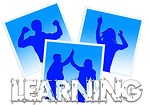“Supercharged learning empowers students!”
Faculty Development Workshop Purpose and Focus
- To help instructors supercharge student learning by exploring highly effective learning principles and classroom implementation strategies
- To help instructors help students learn how to learn
- To help instructors help students develop effective learning habits
Overview
Current research has uncovered numerous ways that people learn and retain new information and skills. Learning how to learn can help convert short-term into long-term memory. As futurist Alvin Toffler predicts, “The illiterate of the 21st century will not be the individual who cannot read and write but the one who cannot learn, unlearn, and relearn.”
Top 29 Learning Objectives
By successfully completing this workshop, participants should be able to demonstrate their expertise in supercharging student learning. This will be evident as participants:
- Demystify the myth that college students know how to learn.
- Apply Gardner’s Multiple Intelligence Theory to the classroom situation.
- Discuss learning style inventories that help students identify their strongest learning preferences.
- Discuss adult learning characteristics.
- Discuss universal principles of why, when, where, and how people learn best and retain new information and skills.
- Differentiate between self-esteem, self-confidence, and self-efficacy (The “I can do it!” Principle).
- Discuss the sources and consequences of self-efficacy.
- Explore strategies that increase student self-efficacy levels.
- Explore The Driver’s Seat (Autonomy) Learning Principle and design classroom implementation strategies.
- Explore The CCC (Compare, Contrast, and Connect) Learning Principle and design classroom implementation strategies (analogies, metaphors, similes, etc.).
- Explore The Crystal Ball (Goal Setting) Learning Principle and design classroom implementation strategies.
- Compare and contrast habits of good and poor readers.
- Develop a list of Reading Tips for Students.
- Create a list of DOs and DON’Ts for assigning reading homework.
- Explore the Writing-to-Learn Principle.
- Explore the Cornell Note-Taking System, and its variations.
- Develop a List of Note-Taking Tips For Students.
- Share techniques for creating Guided Notes For Students.
- Discuss the value of a “brain dump”.
- Explore the Teaching-to-Learn Principle and design classroom implementation strategies.
- Explore The Nomenclature (Vocabulary) Learning Principle and design classroom implementation strategies.
- Explore the FBI (Find by Investigation) Learning Principle.
- Explore effective independent study strategies (mnemonics, digital flashcards, etc.).
- Explore The Co-Pilot (Collaborative) Learning Principle and design implementation strategies.
- Explore The Nutshell (Summarization) Learning Principle and design implementation strategies.
- Develop a List of Test Preparation Tips.
- Develop a List of Test-Taking Strategies.
- Develop a List of Strategies to Reduce Test Anxiety.
- Explore the Self – Reflections Principle and design classroom implementation strategies.
Handouts
Titles
- Nomenclature: Teaching & Learning Definitions
- Best Practices to Enhance Teaching
- Best Practices to Enhance Learning
- Best Practices to Enhance Self-Efficacy Levels
- Best Practices for Note-Taking
- Best Practices for Test Preparation
- Bloom’s Taxonomy
- Quotations: The Teaching-Learning Process
- References and Resources: The Teaching-Learning Process
- Webliography: The Teaching-Learning Process Internet Resources
This faculty development workshop is available to serve as
Professional Development Hours.
Each participant, who successfully completes this
faculty development workshop,
will be awarded a “Certificate of Completion”.
Click to Contact Dr. Nesnick
or
E-mail: Victoria@VictoriaNesnick.com
or
Phone: (631) 889-2178

